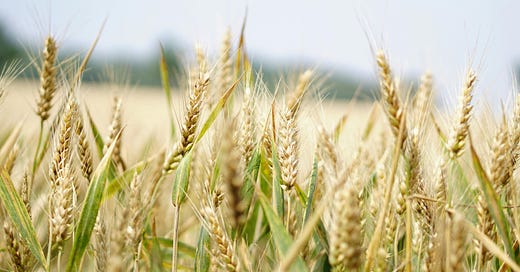Let's start with the first two parables from Matthew 13, which are also parables that Jesus interprets. These are the Parable of the Sower and the Parable of the Wheat and the Tares.
As one of the more well known parables, the interpretive history of the Parable of the Sower is pretty extensive. But here's the thing I would like to remark on: the parable is pretty pessimistic! Most of the seed, for different reasons, fails to produce. Simply put, the Kingdom of God, as sown in the world, is largely unsuccessful.
Which brings us to the Parable of the Wheat and Tares. This parable is also pessimistic. Where the Parable of the Sower describes the Kingdom of God as generally rejected, the Parable of the Wheat and the Tares describes the Kingdom of God as ambiguously mixed. Good and bad grow side by side. Things only get sorted out in a future, eschatological judgment.
The morally mixed and jumbled nature of the Kingdom is also communicated in the Parable of the Net:
“Again, the kingdom of heaven is like a large net thrown into the sea. It collected every kind of fish, and when it was full, they dragged it ashore, sat down, and gathered the good fish into containers, but threw out the worthless ones. So it will be at the end of the age. The angels will go out, separate the evil people from the righteous, and throw them into the blazing furnace, where there will be weeping and gnashing of teeth."
The Kingdom drags in both the "good" and the "worthless" and it only gets sorted out at the judgment.
One more observation. Both the Parable of the Sower and the Parable of the Wheat and the Tares describe a diabolical influence working against the Kingdom of God. In the Parable of the Sower "the evil one" snatches the seed from the heart. And in the Parable of the Wheat and Tares "the evil one" is the "enemy" who sows the tares in the wheat field.
There's a lot more that could be said about these parables, but I want to return to their pessimism. I don't see this point discussed a lot. Consider, for example, how these parables would fit in a book about church growth. Or, rather, how they wouldn't fit. The Parable of the Sower throws water on any expectation that the Kingdom is going to widely take root. And the Parable of the Wheat and Tares, along with the Parable of the Net, says that the people you do attract are going to be a mixed bag. The Kingdom is going to drag in a lot of bad and worthless people. These are not very encouraging messages!
Which goes to back to what we discussed in the last post, how most of the people listening to these parables didn't understand them. The reception of the parables mirrors the teaching of the parables, that the Kingdom of God is only perceived by the few and that the crowds surrounding Jesus were a mixed lot, the good (soil and fish) mixed in with the evil, worthless, and unfruitful.
Personally, I think this mirrors our current reality. The net of Christianity has pulled in a lot of worthless fish. Evil has infiltrated the field and grows side by side with the good, giving the church a morally corrupt countenance. And if you asked me how many Christians were sitting in the pews of American churches my answer would echo the Parable of the Sower:
"Few."




These are hard sayings. God have mercy, Christ have mercy.
Actually, I feel I want to comment on this again! this insight into the parables is ironically encouraging for me personally, as it explains the reality of what I see and have seen my whole life - we do see SOME good seeds take root, but we also see choking weeds that seem to dominate and they have the biggest, loudest voices and visual presence. Social media and self-promotion has made all this worse in the last couple of decades. It’s suffocating. I am weirdly encouraged by Jesus’ pessimistic message! It is because it explains it. It explains my experience and helps me anchor my hope in the right things. It is good insight to for how I can exist in the church and mentally it will help I think, as so often I sit amongst the people of god in utter confusion and it exhausts me. I feel with this insight, this reality check and warning from Jesus which has greatly encouraged me, like I can have a go again at mixing with Christian community, instead of sitting in isolation ruminating inwardly on why I struggle amongst what is supposed to be a reflection of the kingdom of heaven.
It also explains why I feel the church is often an illusion rather than real. But the good news is some of it is real, it just gets drowned out by the tares which by nature will always be louder and relentless. I have always felt there is a hiddenness about the true Jesus and even the way he teaches by using parables suggests there is strangely a hiddenness about Jesus. God in tangible plain sight, but hidden somehow.
I love the comment on our mistake to think Jesus was an evangelist in the converting crowds sense - I think this is true, he wasn’t. He healed people, they consumed what he had to offer, took the freebie but then most of them seemed to get up and move on, which is why Jesus dismissed the crowds, or ended up just left with a few people trying to digest the hard teachings.
Thanks for these insights. Priceless. Will now move on to part 3😊